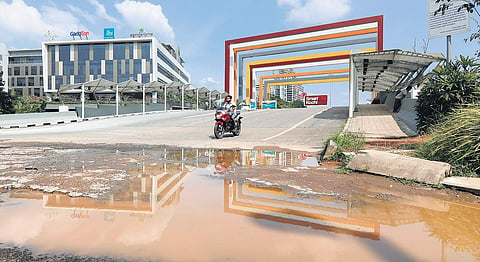

KOCHI: The name Infopark elicits the image of a hi-tech space replete with all facilities that a common man can only dream of. However, the ground reality tells a different tale. Connectivity problems, insufficient accommodation for men, lack of safety for woman employees, no proper waste management system, pothole-filled roads and lack of budget eateries plague Infopark at Kakkanad, giving over 40,000 techies working in the tech-zone a hard time. Began in 2004, Infopark is the key investment-destination in central Kerala, but the lack of infrastructure and other amenities tell a sorry tale.
TNIE spoke to techies and senior officials on the major issues that 100-acre software zone faces, and finds that unless a proper solution is evolved as early as possible, the situation may slip into a point of no return.
No streetlights, CCTV cameras
Absence of streetlights on the campus is causing hardships to techies, especially women working in night shifts. “Think of walking through a dark and empty road. The thought itself is scary even for a man. So imagine how a woman feels,” said Abhishek Jacob, secretary of Infopark-based non-profit organisation, Progressive Techies. “The IMG junction-Carnival Infopark stretch has no streetlights. With minimal transport facilities available after 7.20pm, women on night shifts have to walk the entire stretch to their hostels in and around the IT park,” he said. Also, there are no CCTV cameras on the route, he said.
Indulekha V, a member of Progressive Techies, said there were many incidents when women had to face harassment from anti-social elements. “The dark road provides ample cover for those who want to create trouble,” she said. There are more than 40 hostels in and around the IT park, where over 1,000 women stay, she said. “The pink police wind up their patrolling by 7 pm,” she said.
Abhishek said: “The PWD is the agency which should be installing the streetlights. However, the project to install streetlights on the stretch has been handed over to a private agency called Novatel. But it is said the lights -- run on solar power -- will be installed only halfway till Edachira. Even the quality of the lights installed is very poor.”
Lack of connectivity
Connectivity is a major issue at Infopark. Unlike Technopark in Thiruvananthapuram, which has public transportation services on its campus, those working in Infopark are left at the mercy of autorickshaw drivers and private taxis. “A lot of techies from Ernakulam and neighbouring districts work in various companies in the park. Many from Muvattupuzha, Thrissur and Cherthala travel daily for work. Due to the absence of proper bus service, they are forced either to come in their own vehicles or hire a cab,” said Vineesh T, president, Prathidhwani Kochi, a welfare organisation for IT employees. According to him, almost all buses terminate their services at Kakkanad, Kaloor or Ernakulam KSRTC bus station. Also, buses are not allowed inside Infopark campus since it is a Special Economic Zone (SEZ). The techies demand that the bus services be extended till Infopark.
“Buses conduct services in the fringe areas of the IT park and the last KSRTC bus from Infopark leaves at 6.45pm,” said Vineesh. After much hullabaloo, the KSRTC started operating weekend long-haul services from Infopark to Thiruvananthapuram, Kozhikode, Palakkad and Thrissur.
Feeder service stopped
According to techies, their commutation woes got a brief reprieve when the Kochi Metro Rail Ltd (KMRL) launched the ‘City Water Bus’ service in 2014. It was operated by the State Water Transport Department from Vyttila to Kakkanad. KMRL had also facilitated mini-feeder buses service to provide last-mile connectivity. But, the KMRL stopped the service in 2017 citing budgetary constraints, said Abhishek.